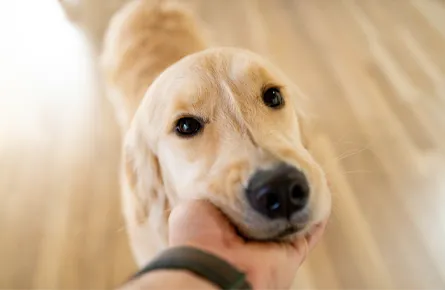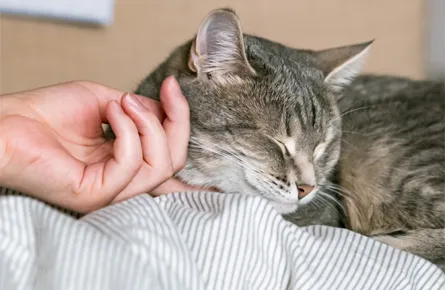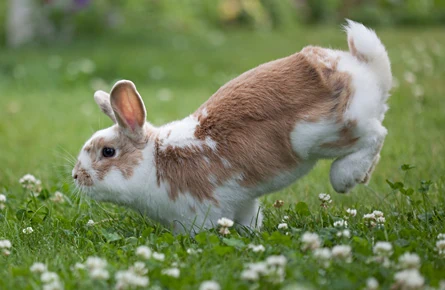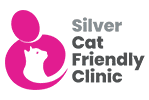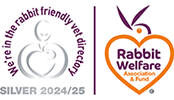Here at Sandhole Vets, we believe that pet vaccinations are an important part of protecting your pets from severely harmful yet preventable diseases and are an essential part of responsible pet care.
Dogs, cats, and rabbits are susceptible to many life-threatening diseases, but scientific advances and the introduction of immunisation have dramatically reduced the number of cases. It is tempting to assume that they are no longer a threat to our pets as we hear little about them, but they still do remain a constant danger, meaning the correct pet vaccination programme is the best way to keep your pet safe.
Book a pet vaccination appointment
How Do Pet Vaccinations Work?
Vaccines contain harmless (either weakened or dead) variants of viruses and other infectious agents. When an animal is vaccinated, the immune system responds by generating a protective mechanism by forming antibodies. If the animal becomes exposed to the actual disease later, those antibodies will prevent the disease from developing.
The type of vaccines Sandhole Vets recommends will be based on your pet's lifestyle, risk factors and current guidance. Modern vaccines give protection to multiple diseases with just one or two injections. It is important to remember that vaccines don't give lifelong immunity, so regular booster vaccinations are recommended. It is also an excellent opportunity for your pet to have a full health check.
Dog Vaccinations
Puppy Vaccinations
The sooner your puppy is vaccinated, the sooner they will be able to begin socialisation with other dogs. Adult dogs are advised to have an annual booster vaccine. A full health check is booked for every dog that is having a vaccination to ensure that they are in good health before giving the injection.
Your puppy can start receiving vaccinations as early as 6-8 weeks for:
- Distemper: spread by eye and nose discharge dog to dog
- Canine Hepatitis: spread by infected urine, faeces and saliva
- Leptospirosis: spread by infected urine or stagnant water
- Parvovirus: spread via infected faeces dog to dog
Vaccination Schedule:
- 12 Weeks: Typically, the second round of Distemper, Hepatitis, and Parvovirus vaccinations, along with the second Leptospirosis vaccination, is administered at this age.
- 10 Weeks: For earlier socialisation, the second Distemper, Hepatitis, and Parvovirus vaccination can be given at 10 weeks, followed by the final Leptospirosis vaccination 4 weeks later.
- Adult Dogs: Adult dogs require annual booster vaccinations to maintain protection.
Sandhole Vets also offers the following dog vaccines:
- Rabies
- Leishmaniasis
- Herpes
- Kennel Cough
Kennel Cough Vaccination
If your dog needs to go into kennels or daycare, they will need a Kennel Cough vaccination. Please ensure you seek advice to ensure they are covered before booking them in; most kennels request animals be vaccinated at least two weeks before boarding.
The kennel cough vaccination protects against Bordetella and Parainfluenza and lasts for a year so that it may be given at the same time as your annual vaccinations. The vaccine can be given from 3 weeks of age.
This is a live vaccine which is often administered as a nasal spray. It will reduce the chance of your dog contracting kennel cough and the severity of the disease, but it cannot provide full immunity due to the variety of strains involved. Due to this pet vaccination being live, dogs can exhibit mild symptoms of the disease temporarily after the vaccine. If you are immunocompromised, then please inform the Vet as the vaccines will need to be performed without you present.
Rabies Vaccination
Please contact us to discuss rabies vaccinations. If you're planning on taking your pet abroad, they may need the vaccine administered with plenty of time before travelling depending on where you are travelling to. Please see the current guidelines on the government website.
Book a pet vaccination appointment
Cat Vaccinations
Kitten Vaccinations
Here at Sandhole Vets, in Kent, we provide the optimum standard in pet vaccinations.
We believe that vaccinations are an important part of protecting your animals from severely harmful, yet preventable, diseases and are an essential part of responsible pet care.
We follow the most up-to-date, independent veterinary guidelines to give the very best protection against disease.
Longer-Lasting Protection for Puppies & Kittens
Most vet practices stop vaccinations at around 12 weeks, but research shows that many pets still have maternally derived antibodies (MDA) at this age. These antibodies can block vaccines from working, leaving young animals unprotected against serious illnesses, such as Parvovirus.
To ensure your pet is protected at the exact time their natural immunity fades, we
- Give a third vaccine at 16 weeks
- Bring the booster forward to 26 weeks (instead of the traditional one year)
Book a vaccination appointment
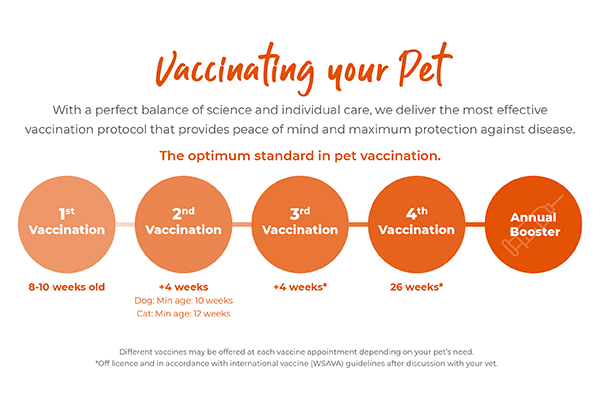
Better Protection Against Leptospirosis
Some vaccine protocols only protect against 2 strains (L2). Our updated L4 vaccines protect against 4 strains — including Leptospira Australis and Leptospira Grippotyphosa, which are present in the UK and can infect dogs, causing serious illness.
Smarter, Tailored Vaccination Schedules
We can now use simple blood tests (serology) to determine whether your pet needs a vaccine, helping to avoid unnecessary doses for those concerned about “over-vaccinating.”
Individualised Protection for Cats
Instead of a one-size-fits-all schedule, we create vaccine plans based on your cat’s lifestyle and exposure risk, so they get exactly the protection they need — no more, no less.
Dogs, cats and rabbits are susceptible to a number of life-threatening diseases, but scientific advances and the introduction of immunisation have been very effective in reducing the number of cases dramatically. It is tempting to assume that they are no longer a threat to our pets as we hear little about them, but they still do remain a constant danger, meaning the correct vaccination programme is the best way to keep your pet safe.
How do pet vaccinations work?
Vaccines contain harmless (either weakened or dead) variants of the viruses and other infectious agents. When an animal is vaccinated, the immune system responds by generating a protective mechanism through the formation of antibodies. If the animal is then exposed to the actual disease at a later date, the antibodies from the vaccination will prevent the disease from developing.
The type of vaccines Sandhole Vets recommend will be based on your pet’s lifestyle, risk factors and current guidance. However, it is important to remember that vaccines don’t give lifelong immunity, and that is why regular booster vaccinations are recommended. It is also an excellent opportunity for your pet to have a full health check. We send out reminders for all vaccinations.
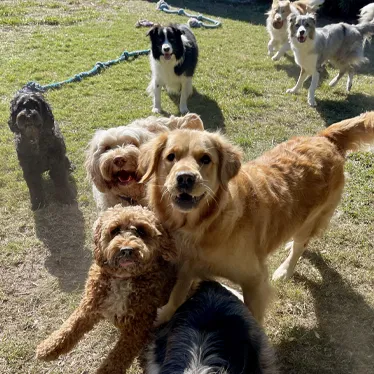
Dog Vaccinations
The primary vaccinations for puppies help to overcome the remaining antibody protection that they still have from their mothers and ensure reliable protection at an early age. The first vaccination is usually given at 8 weeks old, followed by 3 consecutive vaccinations from 4-week intervals up to 26 weeks old*.
Socialisation can occur after the 1st vaccination in a controlled way. Please discuss this further with your veterinary team to determine the best way to socialise your puppy safely.
Our advanced vaccination course ensures that puppies are protected, as they may not respond to early vaccines due to the presence of maternal antibodies.
Sandhole Vets recommends that yearly boosters be obtained to ensure immunisation is up to date. We can provide the following vaccinations for your dog:
- Parvovirus
- Leptospirosis
- Distemper
- Canine Infectious Hepatitis
- Rabies
- Kennel Cough (Bordetella and Parainfluenza)
A full health check is booked for every dog undergoing vaccination to ensure it is in good health before receiving the injection.
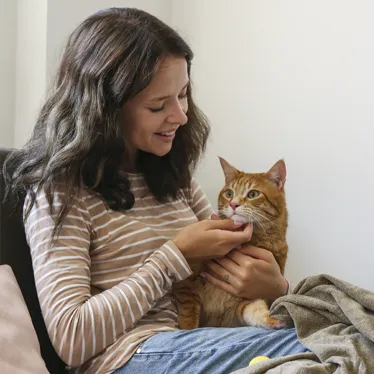
Cat Vaccinations
The primary vaccination course for kittens consists of 4 injections. As with puppies, kittens will have some protection from their mothers in their bloodstream, which is why 4 injections of the vaccine are required to immunisation.
Kitten vaccinations start from 8 weeks of age, followed by 3 consecutive vaccinations until your kitten is 26 weeks old*
A certificate of vaccination will be provided at the end of the course for your records.
It is important for annual boosters to maintain effective immunity. Here at Sandhole Vets, we can vaccinate your cat against the following diseases:
- Cat Flu
- Feline Enteritis
- Feline Leukaemia Virus
- Feline Chlamydophila
We can talk you through any vaccination that may be required for your cat.
Different vaccines may be offered at each vaccine appointment depending on your cat’s needs.
*off licence and in accordance with international vaccine (WSAVA) guidelines after discussion with your vet
Spread the cost of essential healthcare for your pet

To spread the cost of pet vaccinations, Sandhole Vets offer the Pet for Life Health plan, which includes vaccinations for your pets including kennel cough for dogs.
FAQ’s
Why does my pet need to have vaccinations every 12 months?
Depending on the disease that your pet is being vaccinated against, the period they are protected will differ. Certain diseases only carry around 12 months of protection, which is why a yearly booster is recommended. Even though your pet might be vaccinated every 12 months, it is not always against the same diseases – your vaccination card will show you which diseases they are getting boosters for each visit. Visiting us every 12 months for vaccinations also means your pet gets a full annual health check, which is equally important!
Does my pet need to be vaccinated if they live inside?
Although your pet may not go outside, it is still possible for diseases to be brought into the house. They could be in soil on a dirty boot or transmitted through wildlife animals that could enter the home.
I have heard that vaccines are risky, and to avoid them – is that true?
Any veterinary procedure that is performed can carry some sort of risk; however, in the case of vaccinations, it is important to remember that the benefits of being vaccinated greatly outweigh the risks for most pets. Vaccination reactions are rare, and where they do occur, they are mostly short-term and mild. Reactions of this nature show that the vaccine is effectively stimulating the immune system.
The team at Sandhole Veterinary Centre is always happy to talk to you about the benefits and risks of vaccinating your pet to help identify the most suitable strategy as part of their wider preventative healthcare programme.
Are there any schemes/offers at Sandhole Vets to help with covering the cost of my pet's vaccinations?
Our Pet Health for Life Plan offers the best value way to vaccinate your pet to ensure they have the preventative health protection they need over their lifetime. Being a member allows you the opportunity to spread the cost over 12 months whilst also receiving discounts on other services at Sandhole Veterinary Centre.
Please contact us if you would like further information on vaccination programmes for your pet or our Friends and Family plan.


